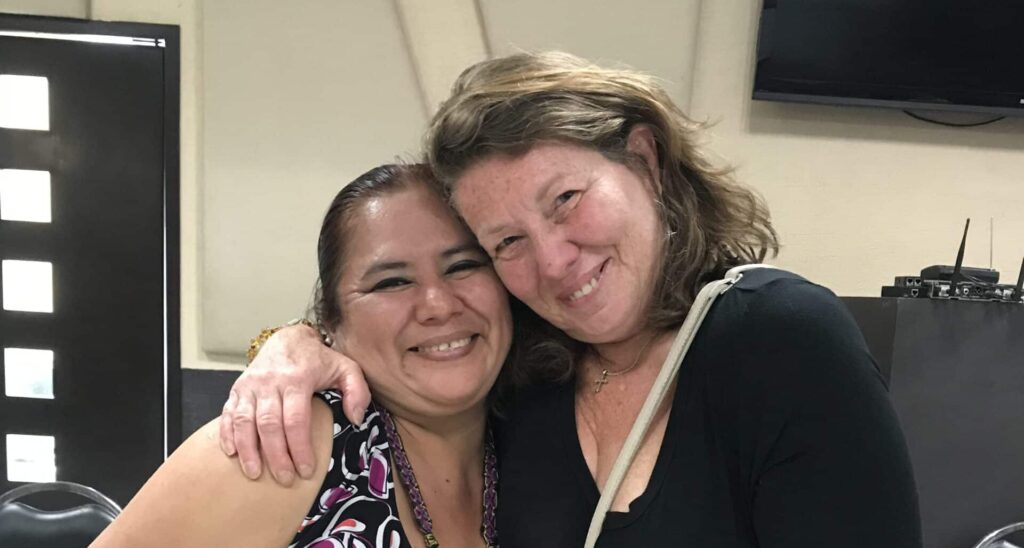
Table of Contents
In 2022, at the Friends Around the Table Gathering in Guatemala, God formed strategic friendships between His people. Laurel, a long-time medical missions veteran, met Doug and Renee Duffy, missional entrepreneurs in Central and South America, and ideas for ministry started flowing. They launched their first ‘medical brigade‘ in Urraco, Honduras, in January 2024, partnering with local brothers and sisters the Duffys had worked alongside for several years, through a local non-profit, Vida Victoriosa (‘The Victorious Life’). Medical needs were met, the young and old received prayer, and the name of Jesus was lifted up throughout the local region.
The following year (January 2025), they planned another brigade with the local church, and this time, Carol Vensel joined as part of the prayer team supplementing the medical professionals. She arrived in Urraco a few days before the brigade to sit on a judges panel for Dream Tank, a microfinance investment competition for local businesses in the community. We caught up with Carol a few weeks ago to hear more about her time serving on both the panel and in the medical brigade…
Our vision: to bring Kingdom transformation to Honduran communities through spiritual and economic development.
– Vida Victoriosa
Can you tell us a bit more about the Duffys and the people they partner with in Honduras?
Doug Duffy is a missionary and businessman who has been in business in the US and Costa Rica for over 40 years, in many different capacities. Several years ago, the Lord encouraged him to take all of the experience he had gained and give it away, in the form of a multi-language microenterprise training course rooted in biblical principles. Since then, people from all across Central and South America have either taught or participated in the course.
The course is for existing and prospective small business owners, and it lasts about 3 months. The seminars and homework involved are intensive, but if the students are diligent, they should come out of the course with both a supportive community (in the form of a local, monthly business club) and a comprehensive operating plan to launch their business. They will also have the chance to enter something called Dream Tank.
If that sounds a bit like Shark Tank, that’s because it is – but with a Kingdom emphasis. The participants put together a 30-minute presentation on their business (including time for follow-up questions) to ask for investment. The ask could be for something as simple as purchasing a new piece of equipment, or for something larger and more complicated. The winners receive interest-free loans to support or cover the investments they have asked for, as well as ongoing business mentorship.
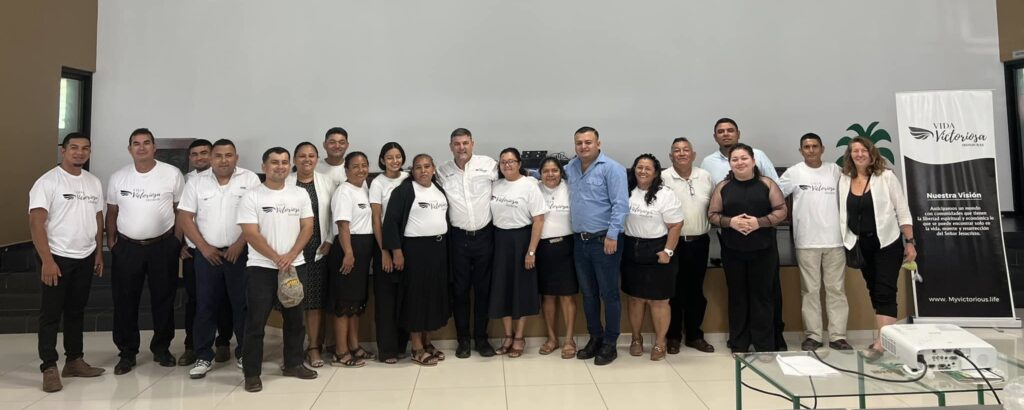
How did you get involved with Dream Tank?
Doug knew I was joining the medical brigade, and when I showed interest in Dream Tank, he invited me to come early to join the business judges panel. On the panel, we had to decide who needed to do a lot more work, whose ideas were great but just needed a little more fine-tuning, and who would receive the grant money.
We met each person very quickly (maybe 5 minutes per person) to give feedback about what we liked and where we thought they could improve, so they could take those ideas and work on them before Doug’s next visit (Doug went back in February to meet with each of the participants one-on-one, and to present the winners with loans for the investments they requested).
I was invited onto the panel because my husband and I owned a small commercial refrigeration business for almost 40 years. As a small business owner, I could understand some of the participants’ challenges, and I could share my experience to help them work through them. I might not know exactly what they’re struggling with, but I had some insights that could help.
For instance, one lady wanted to operate a restaurant, so she requested a fryer. I could see it wouldn’t work: the fryer was just too big for the volume she was talking about. The oil was going to go bad (you don’t want oil sitting in the sun while you’re cooking fish), and people would get sick, as the refrigeration wouldn’t be right. I suggested she scale her fryer down to almost a family-size unit. I hope I added a little bit of value.
On that note, Doug is actively looking for businessmen or women who would be interested in 1) teaching on the course, 2) serving as a Dream Tank judge, or 3) providing business mentorship on an ongoing basis. If that’s you, or you know someone who might be a good fit, please don’t hesitate to reach out to him. (Simply click one of the buttons below to email or call Doug directly.)
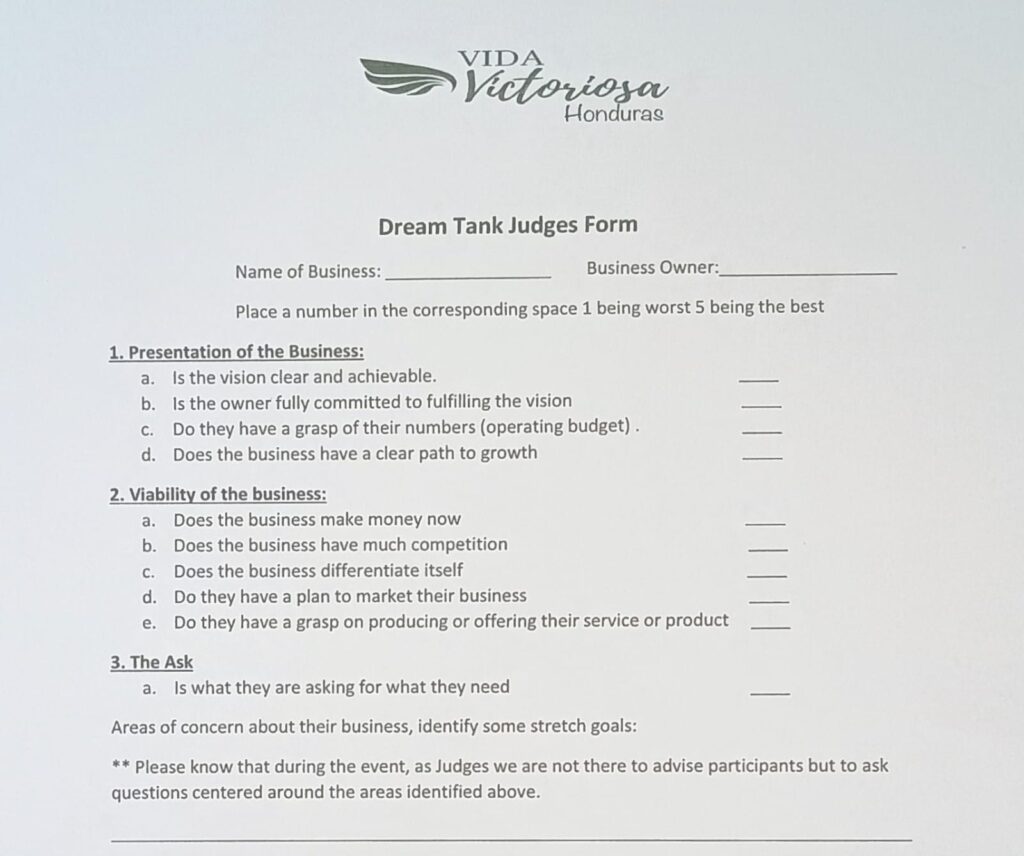
How did you find the experience? What did you notice about the participants?
I absolutely loved being a part of it. We heard from 12 different entrepreneurs. Each one was so valuable. One was making plantain chips (he started as a plantain farmer and now he’s processing and packaging them for the local market); another business was an automobile and motorcycle repair; others still were really small, for instance, a pot-pourri (a tiny convenience store).
It was so, so enjoyable and precious to be there and hear each person’s dreams: what they hope to do next with their lives, in their communities. I would love to be part of the next Dream Tank so I can check in with them to hear about their progress, and the way they have used their funding (if they were one of the loan recipients).
Speaking of progress, I heard from Doug that Martina, a restaurant owner who showed up to support this year’s Dream Tank entrants, was previously awarded a stove and a fridge, and subsequently saved up to buy her own freezer (so she could add frozen chocolate bananas to her menu). In the past year alone, she has opened a second location and added delivery services. What started as a small dream (a three-table restaurant) is now thriving.
Martina, as well as many other past participants in the course, is part of a unified local community (the monthly business club I mentioned earlier). They meet to help solve one another’s problems, share their wisdom, and follow Jesus together. Everyone seems to be friends. Now, some seem to be closer than others (as some of the people who were there are based a little further away), but at the very least, they have spent meaningful quality time with one another on the training program.
The program itself is connected to a local church, which also hosts the medical brigade. It’s not just a one-track thing; they work in all sorts of different ways to share the Gospel and serve their communities. One of the local people Doug and Renee partner with to teach the course, Pastor Rony, also leads that local church. One of the translators — she was awesome — works at a local Christian school and is also a pastor. The man who runs the motorcycle repair business I mentioned is also a bivocational pastor; he wouldn’t survive without his business income.
Pastor Rony is a key part of the business network. Like I said, he helps teach some of the classes, and he knows all the people intimately. When Doug gives feedback, Rony knows their personal story and context — he can say what they are struggling with. Doug might comment on the numbers and logistics, but Pastor Rony sees every day how hard they are working, and where their hearts are. I think that makes them a great team: they can see and carry both sides. Together, they can see and steward a bigger picture.
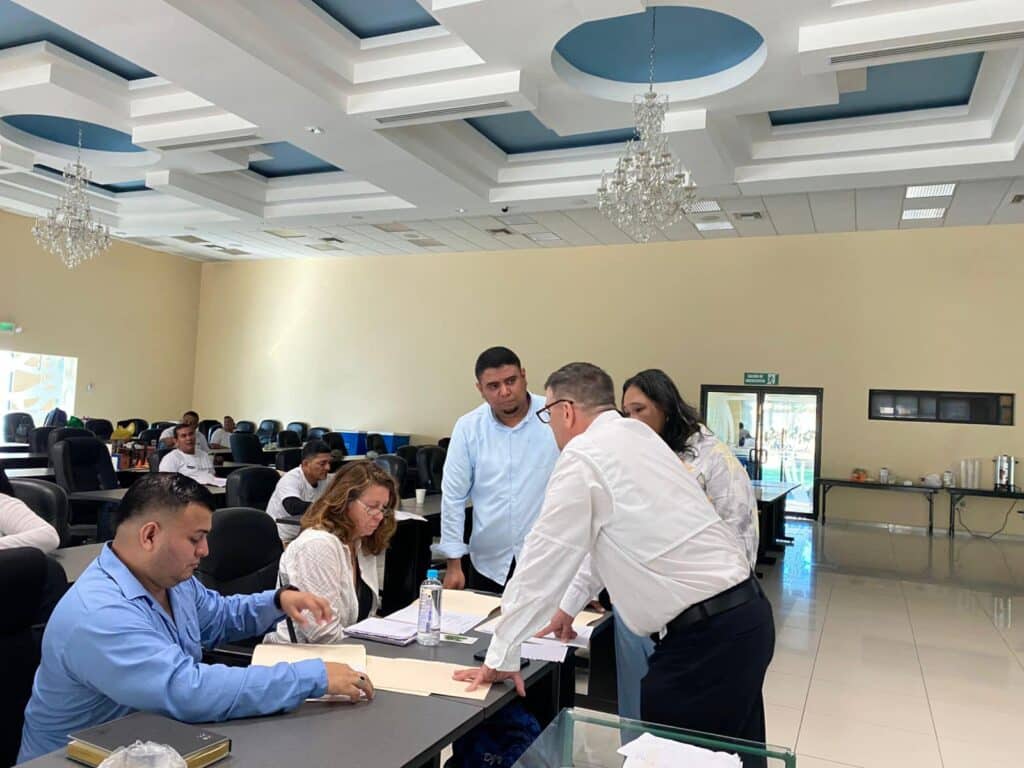
Did any of the entries stand out to you? If so, why?
One guy, Dixon, asked for a Cricut cutting machine to make lettering on ribbons. His was probably the most creative business idea of all the ones we heard. He had used YouTube to teach himself how to craft beautiful flower bouquets from ribbon thread, which he would then sell locally. He started out making roses, and then branched out into all different types of flower bouquets.
If he were able to buy the machine, he could develop his business further by offering ribbon bouquets that said, “Happy Birthday!”, “Happy Anniversary!” and other bespoke messages. Let me tell you, these bouquets are absolutely beautiful (just look at the photos below). It’s crazy to think these fake flowers are just made of ribbon, and listening to his dream — how he came up with this idea, how he started his business, and how he wants to expand what he is doing — was amazing.
To ‘put a bow’ on this story, it just so happened that someone had donated one of the Cricut machines Dixon had asked for to Dream Tank the previous year, and it had been sitting in storage, unused. So, of course, they just gave it to him — exactly what he needed! It was so cool to see God work in the little details like that.
When I teach kids, I tell them to pray with their hands open wide: to receive, but also to give back. I believe you can take whatever talent you have to love people and give it back to God. I love seeing that with kids — seeing the talents God blesses them with when they’re little — and I love seeing that with adults in business like Dixon who think, “God is in this, and I can do this!”
Events like Dream Tank help the participants realize that they can live out the dreams God has placed in their hearts: they learn what is possible and what they need to do to succeed, instead of living with an “I could never do that” mindset. They don’t have to be afraid because they’ve received good training, they have mentors guiding them, and a community to encourage them. Even the program name, Vida Victoriosa, feeds into this, as it means “Victorious Life.”
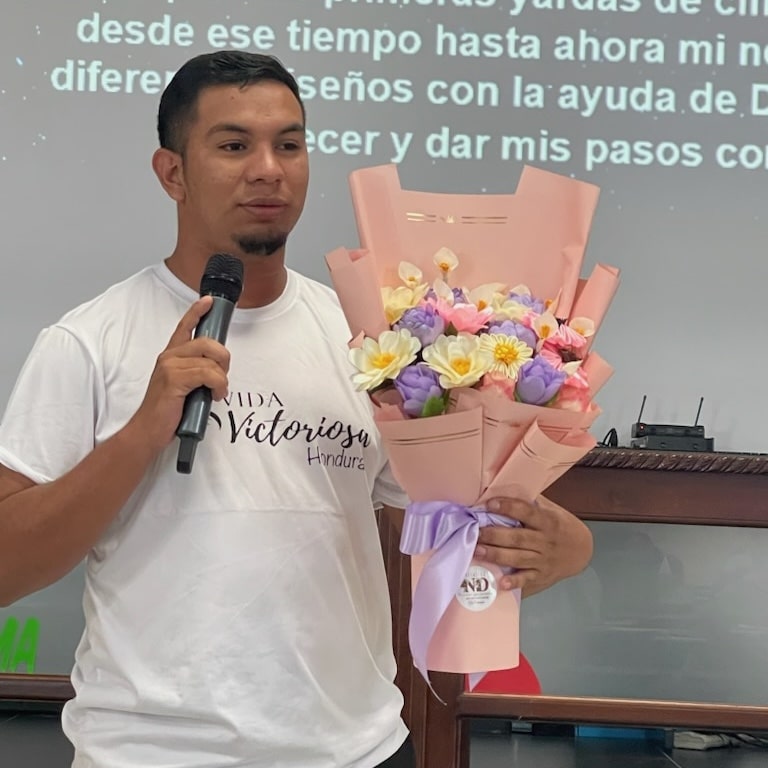
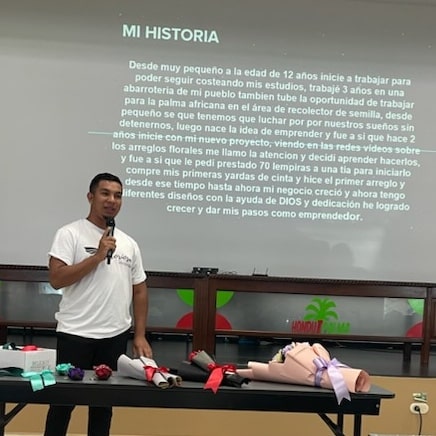
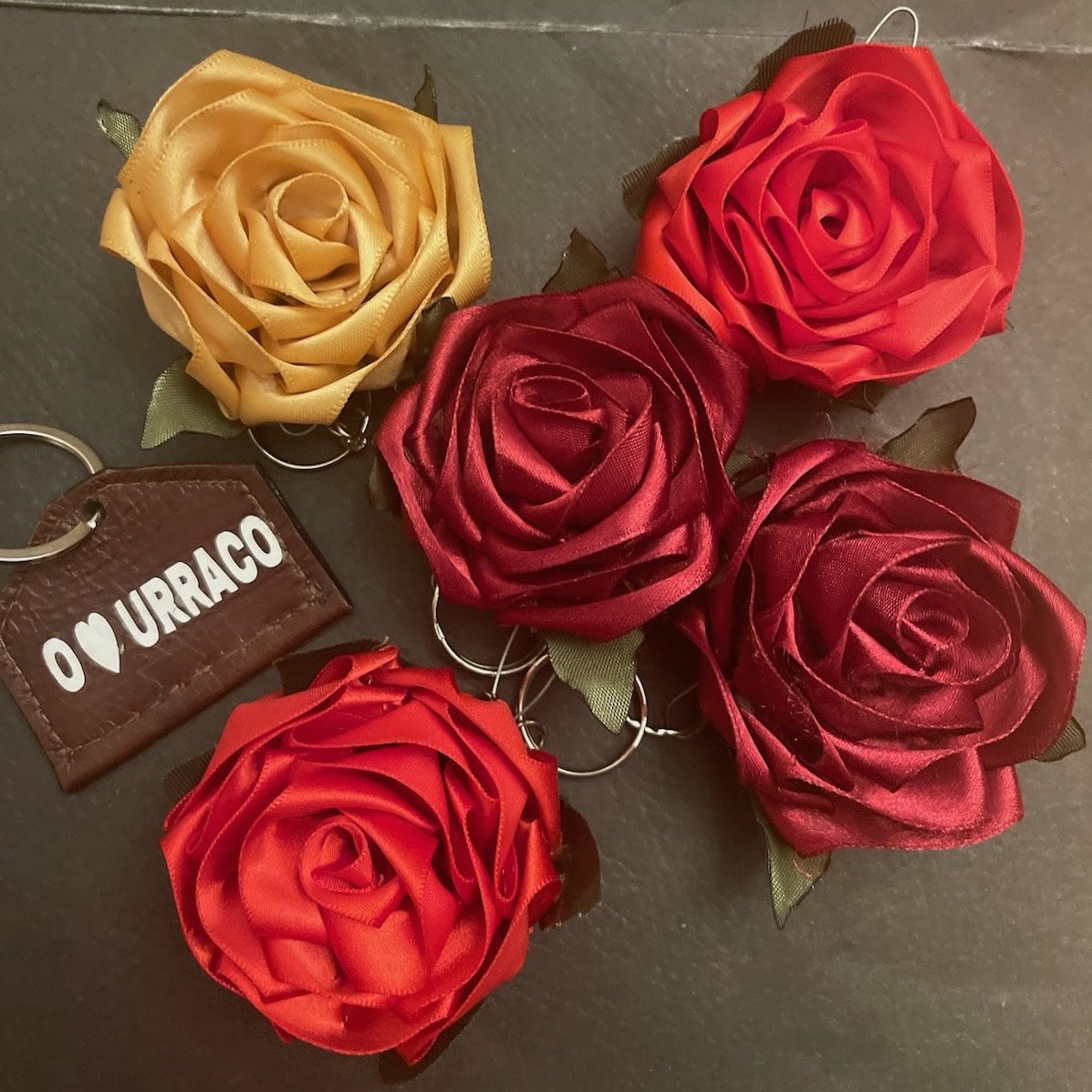
Dixon sharing his story during Dream Tank, plus a sample of his handmade ribbon roses.
How might businesses like these advance the Kingdom of God in Honduras?
There are quite a few Christians in Urraco, and it’s a loving community, with exceptionally loving kids — they all looked out for each other so well that I couldn’t tell if they were brothers and sisters or just friends — but there’s a lot of darkness in the area too. It’s quite secluded, and travelling there is not easy: the roads are flat, but full of craters. You have to drive very slowly to get in. Most people use motorcycles; very few have cars.
During the medical brigade (we served 700-800 people over four days), I met two young boys. I was in the prayer room when their grandmother brought them in. She had just been treated, and everyone had to come through the prayer room before they got to the pharmacy.
Before we prayed, she told me, “I am missing five boys.” I didn’t understand what she meant, but she explained, “Three were murdered, and two died in accidents.” That was why she was raising these young boys: their dad was one of the casualties, and all of their uncles were dead.
Most of the time, when you pray with the kids, they’re quiet. They might agree to pray with you, but quietly. Not these two boys; they prayed. Their grandmother prayed. It was powerful, and they touched my heart. They were just second-graders, but they had already been through so much. I doubt they were the only ones.
When I think about the challenges these kids face, and I think about businesses, I can see how encouraging and equipping entrepreneurs in communities like this can make a huge difference. They can bring dreams and prayers to life, they can bless people in their community, and they can share and witness about Jesus as they’re doing it. For me, that’s what Godly business is all about: seeing business as an opportunity to bless and transform entire communities, not just provide for one person or family.
"For me, that's what Godly business is all about: seeing business as an opportunity to bless and transform entire communities, not just provide for one person or family."
There was one girl I talked to who did not present at Dream Tank but who helped with the brigade. She was younger — I’m guessing around 20 — and she had gone through the business classes. Someone asked her about the competition, and she replied, “Oh, I’m too scared to do that…” We encouraged her: it’s just one small step! Maybe she’ll try next year. She’s still interacting with the community, and because of that, I’m sure she’ll get to a place where she thinks, “I can do this too.” That’s what dreams from God are all about: you have to ask God, “What can I do with this?” and then take the next step.
I would love to see partnerships and communities like this in so many other mission initiatives. I hate when you go somewhere on a mission trip, leave, and then think, “We didn’t do enough.” You want to know that there is at least one step the local community can continue with. Dream Tank and the business training are exactly that: huge steps — and God knows where those will lead…
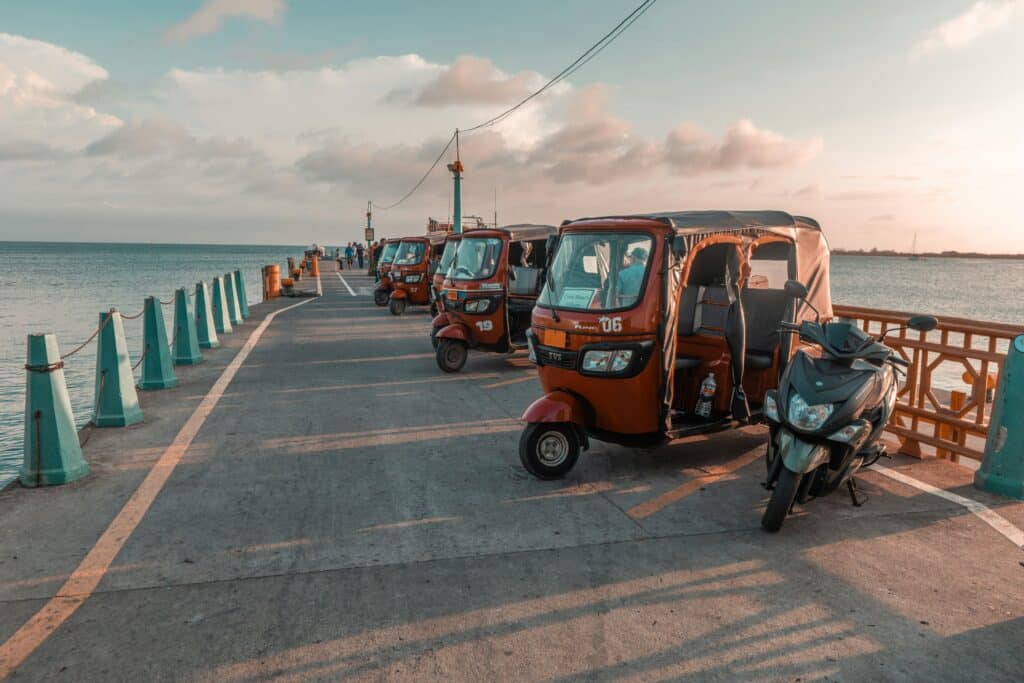
“‘In the last days, God says, I will pour out my Spirit on all people. Your sons and daughters will prophesy, your young men will see visions, your old men will dream dreams."
Acts 2:17